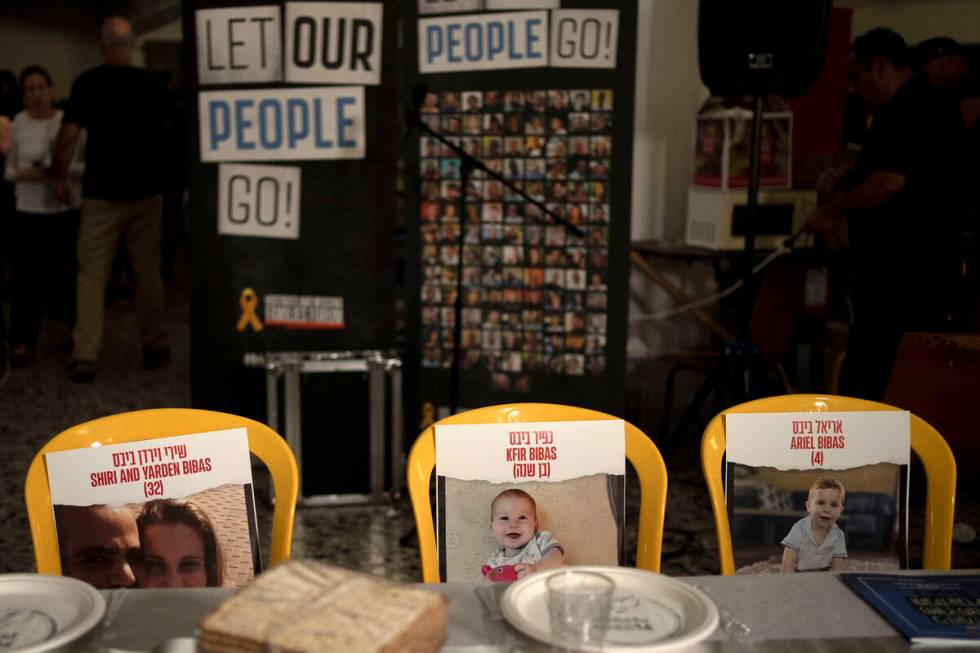Israelis grapple with how to celebrate a holiday about freedom as many remain captive

JERUSALEM — Every year, Alon Gat’s mother led the family’s Passover celebration of the liberation of the ancient Israelites from Egypt thousands of years ago. But this year, Gat is struggling with how to reconcile a holiday commemorating freedom after his mother was slain and other family members abducted when Hamas terrorists attacked Israel.
Gat’s sister, Carmel, and wife, Yarden Roman-Gat, were taken hostage in the Oct. 7 terrorist attack. His wife was freed in November but his sister remains captive.
“We can’t celebrate our freedom because we don’t have this freedom. Our brothers and sisters and mothers and fathers are still in captivity and we need to release them,” Gat said.
On Monday, Jews around the world will begin celebrating the weeklong Passover holiday, recounting the biblical story of their exodus from Egypt after hundreds of years of slavery. But for many Israelis, it’s hard to fathom a celebration of freedom when friends and family are not free.
The Hamas terrorist attack killed some 1,200 people, while about 250 others were taken hostage. About half were released in a weeklong cease-fire in November, while the rest remain in Gaza, more than 30 of them believed to be dead.
For many Jews, Passover is a time to reunite with family and recount the exodus from Egypt at a meal known as the Seder. Observant Jews avoid grains, known as chametz, a reminder of the unleavened bread the Israelites ate when they fled Egypt quickly with no time for dough to rise.
But this year many families are torn about how — or even if — to celebrate.
When Hamas terrorists attacked Kibbutz Be’eri, Gat, his wife, 3-year-old daughter, parents and sister hid for hours in their rocket-proof safe room. But fighters entered the house and killed or abducted everyone inside, except for his father who hid in the bathroom. His mother was dragged into the street and shot.
Gat, his arms and legs bound, was shoved into a car with his wife and daughter. During a brief stop, they managed to flee. Knowing he could run faster, Roman-Gat handed him their daughter. Gat escaped with her, hiding in a ditch for nearly nine hours. His wife was recaptured and held in Gaza for 54 days.
Passover this year will be more profound as freedom has taken on a new meaning, Roman-Gat told The Associated Press.
“To feel wind upon your face with your eyes closed. To shower. To go to the toilet without permission, and with the total privacy and privilege to take as long as I please with no one urging me, waiting for me at the other side to make sure I’m still theirs,” she said in a text message.
Still, Passover will be overshadowed by deep sorrow and worry for her sister-in-law and the other hostages, she said. The family will mark the holiday with a low-key dinner in a restaurant, without celebration.
As hard as it is in times of pain, Jews have always sought to observe holidays during persecution, such as in concentration camps during the Holocaust, said Rabbi Martin Lockshin, professor emeritus at Canada’s York University, who lives in Jerusalem.
“They couldn’t celebrate freedom but they could celebrate the hope of freedom,” he said.
The crisis affects more than the hostage families. The war, in which 260 soldiers have been killed, casts a shadow over a normally joyous holiday. The government has also scaled back festivities for Independence Day in May in light of the mood and fearing public protests.